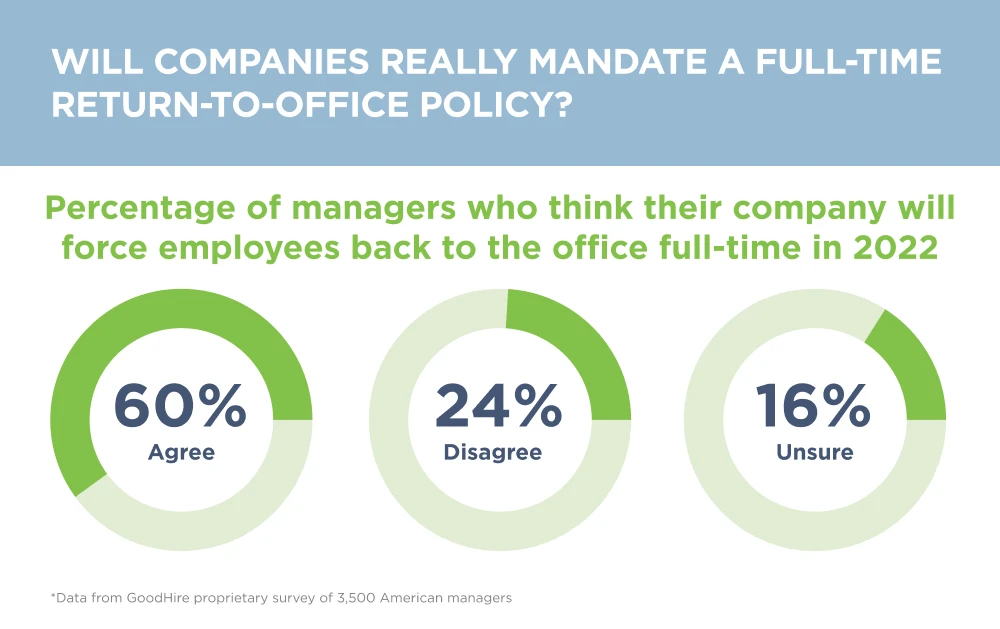Until last year companies were advocating the benefits of work from home (WFH). However, the table has turned as the pandemic era begins to end. Managers believe that fully remote work will soon end. Some even warn of severe consequences for employees who refuse to fall in line.
According to a recent survey, 60% of managers agreed that a return to work is possible in the near future. But what’s more interesting is the fact that 75% of managers didn’t shy away from accepting that they want employees to be back in the office.
Even though 73% of managers stated that employee productivity and engagement have improved or remained the same during the work from the home era, the desire to bring back workers is not uncommon. Remote management was a major cause of burnout for 69% of managers.
The study was conducted by GoodHire, a leading employee verification service provider. 3,500 managers in the US participate in the study to understand managers’ views on work from home and return to office demand.
Employees, however, are not getting along with managers’ demands. Multiple incidents are being about employees resigning from their jobs are being reported. From Apple to small startups, employees have stated resisting the company’s demand to return back to the office.
Managers believe that employees’ attitude is unscrupulous, and haven’t hesitate in issuing warnings.
Approximately 77% of managers said, rather warned, that remote employees would face severe consequences if they chose to stay away from the office. This could include firings, reductions in pay, and losing promotion opportunities. Particularly, around half of managers who participated in the study stated that they would reduce the wages of remote employees who are not paying heed to the company’s demand – an action that could backfire in an intense labor market where salaries are so high.
Experts, on the other hand, recommend that managers seek feedback from employees to defuse the situation by striking outbalance rather than imposing harsh punishments.
Only 23% of managers stated that they would allow employees to work remotely full-time if their company requires them to return to the office.
“The survey results highlight the disconnect between managers’ attitudes towards remote workers and their team’s productivity in remote work environments. “Clearly, managers are struggling,” stated Max Wesman, COO – GoodHire.
He advocates that leaders need to support their managers, implement the right tools and programs, and provide them with the training and tools they need to make hybrid and remote work arrangements a win-win situation for all parties involved.
It’s a well-known fact that working conditions that are satisfactory to the majority of employees will result in increased productivity and retention which is crucial at a time when the industry is witnessing a talent war across all roles and sectors.

Managers also have a split opinion on whether employees want to return to the office full-time. 51% of participating managers believe that employees would like to, and 49% are unsure or do not think that employees wish to return. 60% of respondents agreed that incentives are a great way to encourage employees to return to work. Besides, additional perks like happy hours, snacks, and free lunches are other motivational factors.
In the last few months, few companies have started allowing employees to bring their kids with them, but only 12% of respondents said that they would be open to offering child care at work in order to encourage workers to return.
This study underlines the findings of other surveys which show that there is still a divide between top-ranking employees and company leaders regarding remote work. According to another survey of 2,300 senior management professionals by a talent solution company Robert Half International Inc, 66% of senior managers want their teams to work on-site full-time once the Covid-19 pandemic restrictions are lifted. Only one-third of those senior managers supported long-term hybrid schedules.
According to another Robert Half survey, 50% of remote workers would consider another job opportunity – that would allow work from home – if they had to work in the office full-time.
So, how lucrative perks, promotions, and salary hikes would be for employees to give up their demand for work from home? Another study revealed that employees prefer remote work over promotion.
Employees have sensed the market opportunities well enough. Amid the ongoing talent war in all the major markets worldwide, retaining existing employees – especially top performers – are the biggest challenge for companies, let alone hiring new talent. Many companies don’t want to put employees in an uncomfortable situation in current market conditions and have just extended work from home period, instead of giving blanket approval for an indefinite period.
On the other hand, reports about employees picking up multiple jobs or gigs alongside their full-time jobs are painting quite a concerning scenario. While many employees are successfully able to juggle multiple jobs, it’s against the employment policies in most companies.
Data and Information security is another big challenge to tackle for companies in work-from-home scenarios. The leak of business-critical information or trade secrets is keeping companies worried all the time.
Despite all sorts of concerns, high-paying remote jobs are increasing faster than expected. As of the first quarter of 2022, 24% of professional job listings advertised remote work. Remote work is being used by some companies to attract talented engineers from larger urban centers as well.
The tug of war between managers and employees is nothing new, but this time it’s new turf. While employees believe that companies are in no situation to push their demands, employers expect their employees to be more ethical and professional while rejecting companies’ requirements.

